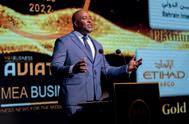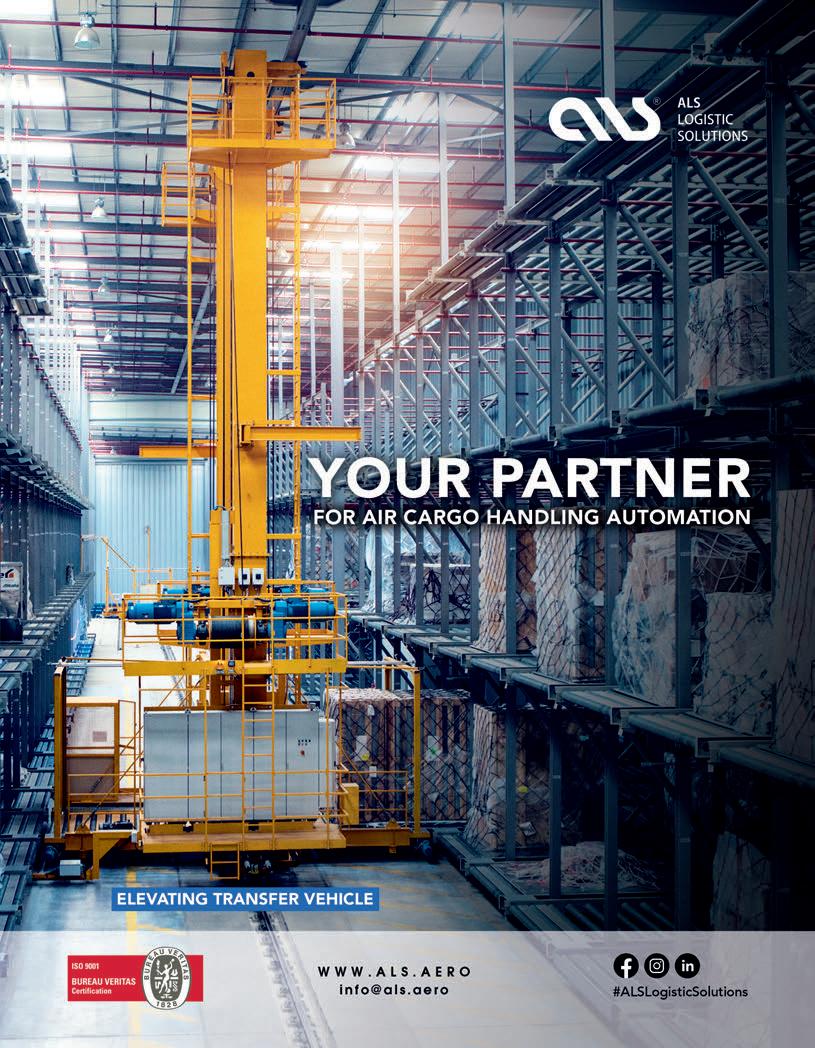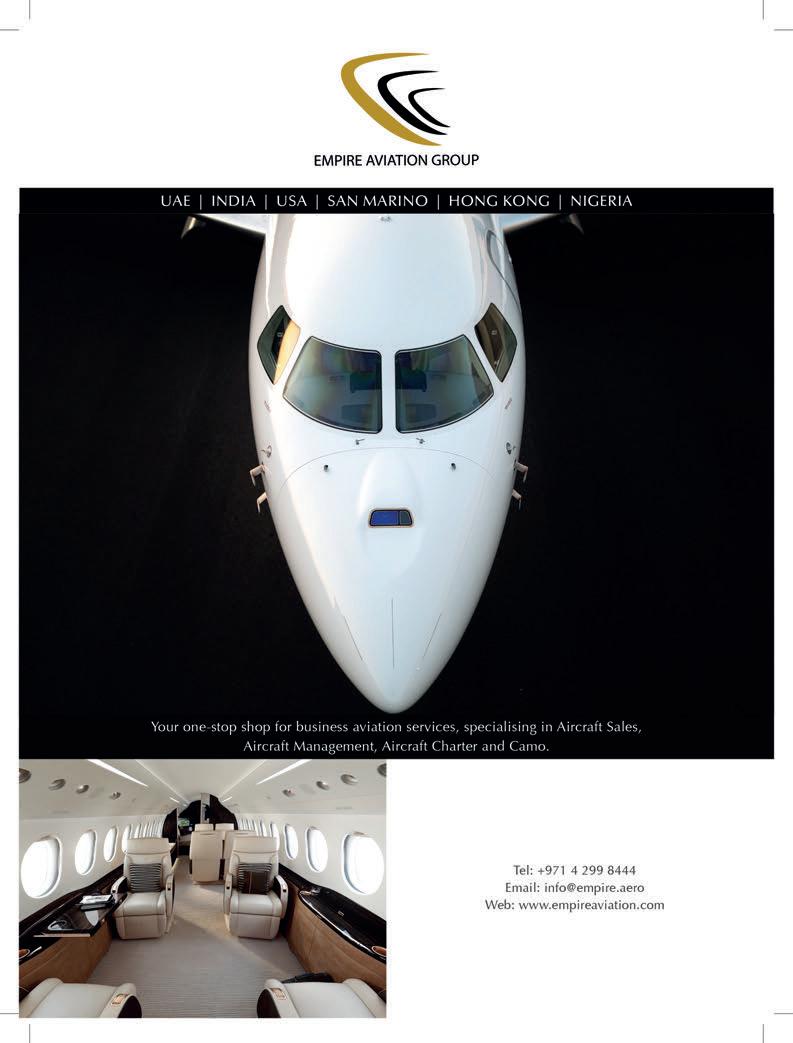UAE SPECIAL REPORT
UAE Country Report

The United Arab Emirates continues to power ahead with strong growth forecast for 2023 and beyond Page





The United Arab Emirates continues to power ahead with strong growth forecast for 2023 and beyond Page



The editorial staff of MEA Business are committed to reporting the positive business developments in the Middle East and Africa, as well as highlighting the business opportunities that already exist in the two regions.
We also want to provide a platform for business leaders to share ideas, engage in constructive debates and form strategic partnerships. Our ultimate aim is to equip business leaders and professionals with the practical and tactical skills to thrive in the Middle East and Africa. With an emphasis on positive news stories, case studies and inspirational interviews, MEA business will inspire readers towards personal development and overall business success.
The magazine is arranged to provide clear and concise informative sections including news sections on the Middle East and Africa, CEO interviews and market updates. The magazine and news service we offer are available on a variety of platforms, these include our printed magazine, e-magazine, website, and social media. Furthermore, we include augmented reality elements in some of our features to provide our readers with unparalleled coverage on the latest developments.
MEA Business also publishes several sector specials throughout the year. These special issues are produced to coincide with important industry exhibitions and events. This month’s issue is a HR Awards special. I hope you will also join me in congratulating all the winners.
Kenneth Mitchen Publisher, MEA Business
12
6 Sharjah Sustainable City kicks off sustainable community engagement program with public urban farms initiative
7 Huawei held its 2023 Middle East and Central Asia Annual Meeting Awards in Riyadh, Saudi Arabia

8 Industrial cybersecurity challenge: Defenses in energy and mining need to be strengthened
10 Emirates launches humanitarian airbridge to transport emergency aid to victims of the Turkey-Syria earthquake
11 Air Arabia delivers record 2022 net profit of AED 1.2 billion, up 70%
COUNTRY FOCUS
12 Powering Ahead
MEA Business
WEB: www.mea-biz.com
EMAIL: info@cme-media.com

PUBLISHED BY: Creative Middle East Media FZ LLE, 19th Floor, Creative Tower, Fujairah Creative City, PO Box 4422, Fujairah, UAE
EXECUTIVE DIRECTOR AND PUBLISHER: Kenneth Mitchen Email: ken.mitchen@mea-finance.com








Sharjah Sustainable City is the first sustainable master-planned community developed by the Sharjah Investment and Development Authority (Shurooq) in partnership with Diamond Developers

extends all the way to encouraging an entirely sustainable way of life. Through our community initiatives, we aim to educate our residents on everything related to eco-friendly living, including urban farming, landscaping, local wildlife, biodiversity, waste reduction and recycling and more. Together, we will work towards a Net-Zero community that offers an aspirational lifestyle that is in harmony with the well-being of future generations.”
Overall, the initiative aims to bring together residents and promote wellness and sustainability practices. It will also serve as a great platform, especially for children, to learn about the efforts and resources required to grow food and create a sense of appreciation, thus reducing food waste.
Sharjah Sustainable City
Extended over an area of 7.2 million square feet in Sharjah’s Al Rahmaniya Area, Sharjah Sustainable City is a leading eco-friendly residential community, promoting a lifestyle that is compatible with the future. With a total of 1,250 sustainable villas, the city is divided into blocks of three-, four- and five-bedroom properties ranging between 2,035 square feet and 3,818 square feet in a built-up area.
The development is in line with national efforts related to the food-energy-water nexus as it provides practical solutions related to food security, water and energy management, as well as natural resources conservation.
Sharjah Sustainable City has kicked off a sustainable community engagement program with its first event, the ‘Discover Your Urban Farm’ initiative.
‘Discover Your Urban Farm’ is designed to introduce Sharjah Sustainable City’s residents to urban farming with access to Agri Pods on which they can grow their own plants or vegetables. ‘Discover Your Urban Farm’ will invite the first of the community’s residents to a planting activity in the community garden pockets, with workshops on learning how to compost using organic waste and growing different plants and vegetables suited to Sharjah’s climate.
An enjoyable family-friendly initiative is aimed to further reduce city’s carbon footprint while creating awareness of the food-energywater nexus, waste management and promoting health and wellbeing.
Commenting on the initiative, Mr. Yousif Ahmed Al-Mutawa, Chief Executive Officer of Sharjah Sustainable City, said: “With over 110 villa handovers completed smoothly, it is thrilling to see our community come alive, with residents experiencing the many benefits of life in Sharjah’s first sustainable residential development. However, creating a truly green community goes beyond simply using sustainable materials and construction techniques, renewable energy and smart home technology. It
The city is equipped with renewable energy produced from rooftop solar panels and built with sustainable materials and passive designs that reduce utility bills and operational costs. As a result, residents can save up to 50% on water and electricity bills. On top of that, the city offers zero service fees for the first five years, as well as complimentary energy-efficient kitchen appliances and smart home features.
In 2022, the city’s first two phases, including 604 spacious and modern villas, were entirely sold out, and it also launched the third phase comprising 324 villas. What’s more, the phase 1 handover has been completed, with handovers of phase 2 and phase 3 expected to take place in 2023 and 2024, respectively.

His Excellency Haytham Al Ohali, Vice Minister in the Ministry of Communications & Information Technology, graced the event, held in the Kingdom for the first time
Steven Yi said: “This is a significant milestone for the first time in our history, in Riyadh, where Huawei CEOs and regional management teams from 21 countries gathered in the Kingdom of Saudi Arabia. Huawei will continue to invest in Saudi Arabia and support the growth of local Saudis. At the same time, we will perform more and more regional management functions in Saudi Arabia and comply with the laws and regulations of the Saudi government.This event was, therefore, an ideal opportunity to celebrate these individual and collective triumphs while formulating another fruitful year ahead. In 2023 and beyond, we remain committed to helping build a connected, intelligent world while inspiring our partners to deliver differentiated services to their customers.”
The ME&CA Annual Meeting and Awards Giving Ceremony is the culmination of another highly successful year for Huawei in the region.
Huawei held its 2023 Middle East and Central Asia (ME&CA) Annual Meeting Awards Giving Ceremony in Riyadh, Saudi Arabia, on Saturday 18 February, bringing together Huawei representatives from 21 countries. His Excellency Haytham Al Ohali, Vice Minister in the Ministry of Communications & Information Technology, graced the event, held in the Kingdom for the first time.
Huawei used the meeting to align on 2023 objectives while recognizing staff for excellence in driving business objectives and differentiated customer experiences. Executives, led by Steven Yi, Huawei President for Middle East and Central Asia, led discussions on business development for the year ahead.
HE. Haytham Al Ohali said: “We realize the benefits of working with the private sector to enhance our ICT capabilities
in support of Saudi Vision 2030. This partnership marks another important phase in our ongoing collaboration with Huawei, whose outcome will elevate the Kingdom’s competitiveness and help to nurture the country’s digital economy.”
In February last year, Huawei announced it would build a cloud region in Saudi Arabia during the inaugural LEAP event, a boost for local businesses and governments’ ability to access more robust and secure cloud services. Later in the year, the Kingdom signed an MoU with Huawei on advancing cloud computing and building smart cities. In June last year, Huawei, in partnership with the Saudi Space Commission, unveiled ‘Future Space’, its first technology experience center in Saudi Arabia. Then in December 2022, The Saudi Ministry of Communications and Information Technology (MCIT) and Huawei signed an MoU to enhance cooperation in ICT on the sidelines of the historic visit of His Excellency President of China Xi Jinping to the Kingdom. MCIT and Huawei pledged to collaborate to realize a ‘10Gbps Society’, seeking to build a superfast broadband infrastructure to support the digital transformation goals of Saudi Vision 2030.
This is a significant milestone for the first time in our history, in Riyadh, where Huawei CEOs and regional management teams from 21 countries gathered in the Kingdom of Saudi ArabiaHuawei held 2023 Regional Headquarter Annual Meeting in the Kingdom of Saudi Arabia (zawya.com)
Throughout 2022, almost 38% of industrial control system (ICS) computers globally have been attacked with malware. In the UAE, the figure sits at just over 39%, according to Kaspersky ICS CERT statistics. This is a high growth threat landscape that no public or private sector entity, especially in critical sectors like energy and mining, can ignore.
“One infected USB drive or a single spear-phishing email is all it takes for cyber criminals to bridge the air gap and penetrate an isolated ICS network. Traditional security is not adequate to protect industrial environments from rapidly evolving cyber threats. As attacks against critical infrastructure increase, choosing the right approach to secure systems has never been more important,” says Emad Haffar, Head of Technical Experts at Kaspersky.
Think of an ICS as a collection of personnel, hardware, and software that can affect or influence the safe, secure, and reliable operation of an industrial process. IT is one component of this environment with operational technology (OT) another key element. While traditional cybersecurity solutions focus on dataoriented businesses, ICS protection is geared towards OT security where it is all about cyber-physical companies such as utilities, mining, manufacturing, and so on.
Effective OT cybersecurity measures must therefore include industrial endpoint protection to prevent accidental infections and make motivated intrusion more difficult, OT network monitoring and anomaly detection to identify malicious actions on the level of programmable logic controllers, and dedicated expert services to investigate the infrastructure, conduct expert analytics, or mitigate the impact of an incident.
“However, despite all the innovations in modern cybersecurity solutions, human error still plays a significant role in compromising ICS systems. As such, it needs to be managed much more proactively than what is currently happening. This requires utility companies, mines, and others operating in the industrial environment to look at building a Human Firewall,” adds Emad Haffar.
One of the best ways to achieve this is through the right security awareness and training solutions that go beyond basic training. Instead, it is about delivering training that is easily digestible, practical, and memorable so it will always stay top of mind. Companies must provide training to ensure staff are armed with the very latest skills and knowledge, especially given how quickly cyber incidents evolve.
Beyond the Human Firewall, there are sector-specific interventions to consider. For instance, modern electrical power systems are complex environments requiring protection,
automation, and control solutions covering all areas of electric power facility operation. Notwithstanding the technical challenges of securing this environment, organisational issues must also be considered. For instance, a lack of guides defining actions to be taken when suspicious activity is detected within automated systems. There is also a lack of documents and practices relating to the investigation of disturbances in technological environments including malicious influence on control systems.
Mines are also hotbeds for potential attacks especially at a time when Industry 4.0 digital technologies link key operational systems to data analytics and cloud environments. Mines are confronted by escalating cybersecurity threats but lack the in-house skills to adequately protect their OT and ICS environments
Beyond the Human Firewall, there are sector-specific interventions to consider. For instance, modern electrical power systems are complex environments requiring protection, automation, and control solutions covering all areas of electric power facility operation. Notwithstanding the technical challenges of securing this environment, organisational issues must also be considered. For instance, a lack of guides defining actions to be taken when suspicious activity is detected within automated systems. There is also a lack of documents and practices relating to the investigation of disturbances in technological environments including malicious influence on control systems.
Mines are also hotbeds for potential attacks especially at a time when Industry 4.0 digital technologies link key operational systems to data analytics and cloud environments. Mines are confronted by escalating cybersecurity threats but lack the in-house skills to adequately protect their OT and ICS environments
Emad Haffar Head of Technical Experts at Kaspersky, provides an overview of how the industrial control system are being targeted by cyber criminals

His
In the wake of the devastating earthquakes in Turkey and Syria, Emirates is setting up an airbridge with the International Humanitarian City (IHC), to transport urgent relief supplies, medical items and equipment to support on-ground aid efforts and search and rescue activities in both countries. The first shipments are due to go out today on EK 121 and EK 117, consisting of high thermal blankets and family tents from UNHCR, followed by World Health Organisation (WHO) and World Food Programme (WFP) relief cargo of medical kits and shelter items, co-ordinated by the IHC in Dubai.
In the coming days, more consignments of blankets, tents, shelter kits, flash lights, water distribution ramps and trauma and emergency health kits will be transported on Emirates.
Emirates SkyCargo plans to dedicate cargo space for around 100 tonnes of humanitarian relief goods over the course of the next two weeks across its daily flight operations to Istanbul. The critical emergency supplies carried on Emirates will then be delivered

by local organisations to affected areas in southern Turkey and northern Syria, supporting on-ground responders and providing much needed aid to the hundreds of thousands of people impacted by the earthquakes.
HH Sheikh Ahmed bin Saeed Al Maktoum, Emirates’ Chairman and Chief Executive, said: “We stand with the Turkish and Syrian people and are working with experts like the International Humanitarian City to help provide urgent relief to those affected and displaced by the earthquakes, as well as support the complex recovery efforts on the ground. Emirates has extensive experience in supporting humanitarian relief efforts, and through its three daily flights to Istanbul will offer regular and consistent widebody capacity for relief items and medical supplies. Emirates also supports the UAE’s ongoing humanitarian efforts to support Turkey and Syria, and Dubai’s unique position as the world’s largest international aid logistics hub means that we can efficiently reach disaster stricken areas and the most vulnerable people as quickly as possible.”
Shaibani, Chairman of the Supreme Committee for the Supervision of IHC: “The IHC remains committed to providing the people affected by the earthquakes with the humanitarian support and resources they need. We are taking urgent action by facilitating airlifts of vital medical supplies, shelter items and other relief goods from the UNHCR, World Health Organization (WHO) and World Food Programme (WFP) to address the pressing demand for aid in the affected regions.”
The freight division of Emirates has a long-standing partnership with the IHC, enabling the airline to nimbly and quickly lead on numerous relief missions, deploying humanitarian supplies to communities around the world impacted by natural disasters, medical emergencies, global outbreaks and other crises.
In 2020, the airline facilitated relief efforts to Lebanon in the aftermath of the Port of Beirut blasts. In 2021, Emirates set up a humanitarian airbridge between Dubai and India to transport urgent medical and relief items to support the country in containing the COVID-19 outbreak. Last year, the airline offered cargo capacity to organisations working with the IHC to transport critical equipment and supplies directly to five cities in Pakistan devastated by flooding.
Over the years, Emirates has also supported humanitarian flights in partnership with the Airbus Foundation, and since 2013, Emirates A380 ferry flights have transported over 120 tonnes of food and vital emergency equipment to those in need.
In coordination with International Humanitarian City (IHC), flights are planned to carry around 100 tonnes of urgent relief items like blankets, tents, medical supplies and other humanitarian goodsExcellency Mohammed Ibrahim Al Emirates launches humanitarian airbridge to transport emergency aid to victims of the Turkey-Syria earthquake
Air Arabia, the largest low-cost carrier (LCC) operator in the Middle East and North Africa, recently announced historic financial results for the full year ending December 31, 2022, almost doubling the profit and passengers’ numbers of the previous year, as the airline continued with its growth plans, delivering remarkable financial and operational performance.
Air Arabia reported a net profit of AED 1.2 billion for the full year ending December 31, 2022, an increase of 70 per cent compared to AED 720 million registered for the full year 2021. The airline turnover for the full year 2022 reached AED 5.2 billion, an increase of 65 per cent compared to AED 3.2 billion registered for the full year 2021.The financial and operational results achieved in 2022 were strongly supported by the growth in passenger numbers that exceeded pre-pandemic levels.
Air Arabia served more than 12.8 million passengers in 2022 from its seven hubs in the UAE, Morocco, Egypt, Armenia, and Pakistan, an increase of 90 per cent compared to 6.8 million passengers carried in 2021. The average seat load factor – or passengers carried as a percentage of available seats – for the full year stood at a high 80 per cent.
Air Arabia’s Board of Directors proposed a dividend distribution of 15 per cent of share capital, which is equivalent to 15 fils per share. This proposal was made following
a meeting of the board of directors of Air Arabia and is subject to ratification by Air Arabia’s shareholders at the company’s upcoming Annual General Meeting.
Commenting on the results, Sheikh Abdullah Bin Mohammad Al Thani, Chairman of Air Arabia, said: “Air Arabia’s 2022 record profitability is considered the best in the company’s operating history. The remarkable operational and financial performance reflect the carrier’s robust business model, its management team, as well as its discerning growth strategy. Although the year 2022 continued be challenging, the aviation industry has begun returning to normality as airlines and airports worldwide witnessed faster recovery following the drop in demand cause by the pandemic”.
He continued: “Air Arabia Group maintained its robust growth in 2022 by increasing its fleet size and adding new routes across its global network while launching the operations of its latest joint venture airlines in Armenia and Pakistan. We are proud that Air Arabia’s value-driven product and services now reaches a wider and fast-growing customer base spread across key regional markets”.
In the fourth quarter ending December 31, 2022, Air Arabia reported a net profit of AED 356 million, 24 per cent less than the AED 467 million registered in the same quarter last year, which witnessed record high yield margins and lower fuel prices.
The turnover for the last quarter 2022 reached AED 1.4 billion, an increase of 7 per cent compared to the same quarter last year. Air Arabia carried more than 3.6 million passengers from its seven hubs in the fourth quarter, an increase of 44 percent compared to 2.5 million passengers carried in the same period last year. The average seat load factor for the same period stood at impressive 79 per cent, reflecting the stable recovery witnessed in demand for air travel.
Al Thani added: “The solid fourth quarter and full year results were supported by the carrier’s cost control measures, strong yield margins and higher demand for its valuedriven product. We remain committed to proving our customers with the best travel deals while continuously investing in growth and product innovation”.
Air Arabia added 24 new routes to its global network in 2022 from its operating hubs in the UAE, Morocco, Egypt, Armenia, and Pakistan. The carrier took delivery of 10 new aircraft and ended the year with a fleet of 68 Airbus A320 and A321 aircraft operating to over 190 routes across the Middle East, Africa, Asia, and Europe. Air Arabia Group has also launched operations of its latest joint ventures airlines in Armenia and Pakistan. In June, “Fly Arna”, Armenia’s National Airline, started its operations from its base in Yerevan and continued to expand its network by adding five new routes; while “Fly Jinnah”, Pakistan new low-cost carrier, started its operations in October and added 4 domestic destinations. Air Arabia Group along with DAL Group signed an agreement to form “Air Arabia Sudan”, a joint venture company that will be based in Khartoum. The new airline will follow the same low-cost business model providing its customer base with a reliable operation and value-driven product.

a strong finish to 2022 led by a strong economic rebound on higher oil prices and production as well as the recovery in tourism, construction and non-oil activity linked to the Expo 2020 Dubai.
“Looking ahead, the UAE economic outlook remains positive supported by domestic activity,” the IMF said last November while projecting that GDP growth will reach 5.1% in 2023 and nonhydrocarbon growth is forecasted to be around 4%.
The UAE has remained relatively insulated from the global economic downturn with the Gulf state projected to maintain aboveaverage growth in 2023 to become the best-performing economy in the Middle East region. Economies around the world have been grappling with a multitude of
shocks—from the war in Ukraine to soaring COVID-19 cases in China—that have sent inflation soaring and weakened activity.
The International Monetary Fund (IMF) forecasted that global GDP growth will slow from 6% in 2021 to 3.2% in 2022 and 2.7% in 2023—the weakest growth profile since 2001. Meanwhile, the UAE enjoyed

Though the world’s largest economies face heightened recession risks, the UAE’s strong reform momentum provides an upside risk to growth and the federal government is leaving no stone unturned in its efforts to diversify the economy away from heavy reliance on oil revenues.
The UAE, the Middle East’s leading business and tourism hub, has introduced a series of reforms over the past few years to increase foreign direct investment and make itself more attractive for foreigners
The UAE enjoyed a strong finish to 2022 led by a strong economic rebound on higher oil prices and production as well as the recovery in tourism, construction and non-oil activity
to live and work amid growing competition from its GCC neighbours.
The performance of the UAE’s banking system improved last year on the back of lower cost of risk and higher interest rates and profitability is expected to reach pre-pandemic levels in 2023. However, the increasing risk of recessions in the US and Europe along with higher interest rates could pressure the operating environment.
Banking sector
UAE banks are entering 2023 ‘on solid footing’ despite higher uncertainty. Banks in the Emirates reported higher profits on the back of improving operating conditions marked by economic recovery and the central bank’s moves to tighten monetary policy.
“Banks’ performance improved in 2022 on the back of lower cost of risk and higher interest rates,” S&P Global said in January while noting that the central bank’s Targeted Economic Support Scheme (TESS) helped the banking system through a period of stress, limiting the increase in nonperforming loans (NPLs). The benefits are expected to continue this year.
The combined profits of the UAE’s top five banks—First Abu Dhabi Bank (FAB), Emirates NBD, Dubai Islamic Bank (DIB), Abu Dhabi Commercial Bank (ADCB) and Mashreq Bank—reached $8.5 billion (AED 31.4 billion) in the nine months of 2022.
FAB, the UAE’s largest lender by assets, reported a 19% increase in 9M 2022 net profits to nearly $3 billion (AED 10.9 billion), Emirates NBD registered a 25% y-on-y increase in profit to $2.5 billion (AED 9.1 billion), DIB’s net profit soared by 34% to nearly $1.11 billion (AED 4.1 billion), ADCB saw it net profits in the nine months to the end of September jump by 22% y-on-y to $1.3 billion (AED 4.7 billion) while Mashreq’s net profit reached $708 million (AED 2.6 billion).
S&P Global said that net interest income—the difference between interest revenues earned from lending activities and interest paid to depositors—at UAE’s banks has soared over the quarters as lenders are passing rate increases on to customers.
The Central Bank of the UAE (CBUAE) hiked its base rate by fifty basis points to 4.4% in December after the US Federal Reserve raised its interest rate by half a percentage point marking one of the most aggressive years in monetary policy history as central banks heightens their fight against inflation.
The UAE’s financial institutions have adequate capital overall and abundant liquidity while their asset quality has improved modestly from pandemic-era peaks. However, pressures on small banks’ profitability, alternative delivery channels and competition from digital banks are expected to increase shareholders’ appetite for consolidation to enhance the resilience of banks’ financial profiles.
Digital banking is swiftly changing the field of play in the UAE financial services sector where incumbents are facing increasing competition from neobanks and challenger banks which are billing on
Payment Systems Strategy, a state-ofthe-art, real-time payments clearing and settlement rail which is an interbank, realtime clearing and settlement infrastructure to which all the commercial banks operating in the country will connect. The instant payment platform is expected to drive substantial economic benefits for corporates and consumers alike.
Digitalisation in the UAE financial service market is partly being driven by tech-savvy customers and regulatory initiatives such as regulatory sandbox and open banking—which are creating an enabling environment.
The disruptions to oil trade and output that followed the war in Ukraine have driven up the cost of commodities while contributing to cost-of-living crises around the world. However, in the UAE, the oil boom has had the effect of pushing budgets into
customer experience as their point of sale.
KPMG said that financial regulators are keen to align the country’s digital agenda with the country’s banking industry operations as neobanks, like the homegrown Zand, are focusing on streamlining operations to conduct highvolume digital transactions.
The leading neobanks in the UAE include RAKBANK-backed YAP, ADQ-owned Wio, Shariah-compliant Zand Bank and Abu Dhabi-based Al Maryah Community Bank. These challenger banks are competing with several speedboats including Emirates NBD’s Liv., Mashreq Neo and DIB’s rabbit.
The UAE is about to roll out its National
the black after the economic impact of the pandemic while creating an ideal environment for the country to proceed with ambitious reforms under favourable macroeconomic conditions.
Global benchmark Brent traded mostly above the $100-mark last year and JPMorgan projected that it would average $90 per barrel in 2023. The UAE, the Arab world’s most competitive economy, approved the federal budget for the fiscal years 2023-2026 last October with a total expenditure of $68.69 billion (AED 252.3 billion).
The Gulf state forecasted total revenues of $69.6 billion (AED 255.7 billion) over the
Looking ahead, the UAE economic outlook remains positive supported by domestic activity– The International Monetary Fund
IN BAHRAIN
A state-of-the-art hub for the region and the globe, BIA is a world-class boutique airport that’s designed to create innovative and technology-driven experiences. Visit us as we take off to great new heights.
bahrainairport.bh

period while revenue and spending for 2023 will grow by an estimated 11% and 4%, respectively. The finance ministry said that the cabinet approved the budget for the fiscal year 2023, with a total estimated expenditure of $17.2 billion (AED 63.06 billion) while total revenues are projected at $17.3 billion (AED 63.6 billion).
The UAE allocated $572 million (AED 2.1 billion), 3.4% of the total general budget, towards the financial investments sector, including $205 million (AED 753 million) which will go towards federal investment projects.
The federal government, which sold its first bond in its half-century history in 2021, returned to international bond markets last October with the CBUAE receiving bids worth $2.1 billion (AED 7.57 billion). The debt is rated Aa2 by Moody’s— the third-highest investment grade and one step lower at AA- by Fitch Ratings.
The increased global uncertainty is driving foreign investment inflow into the UAE while contributing to rapid real estate price growth in some segments. The country is set to host the World Trade Organisation’s (WTO) 2024 ministerial conference, the largest global gathering of trade ministers.
The gathering scheduled for February 2024 will come at a critical time as the global economy is being confronted by a confluence of challenges including the war in Ukraine, an ongoing pandemic and a simmering trade war between the US and China—the world’s two biggest economies.
For the Emirates, hosting WTO’s 13th ministerial conference is part of a broader strategy by the government to burnish its credentials as a global hub for business. The government has been rolling out bilateral trade deals with fast-growing markets since the pandemic.
The UAE signed a wide-ranging economic pact with India in February 2022. The trade pact, called CEPA, removed duty on almost 90% of goods traded between the two states and it is expected to boost bilateral trade from $60 billion to $100 billion within the next five years.
The Gulf state is home to some of the world’s biggest wealth funds including Mubadala Investment Company, Abu Dhabi Investment Authority, ADQ and Investment Corporation of Dubai. Buoyed with cash from last year’s commodity boom, the UAE is investing billions of dollars in Egypt, Indonesia, Sudan and Jordan to diversify its economy away from crude.
In a major policy shift, the UAE said that it will levy a 9% federal corporate tax on business profits exceeding $102,110 (AED 375,000) for the first time starting 1 June 2023, as the Gulf state moves to align itself with new international standards, particularly the move toward a global minimum tax on multinational corporations.
The ambitious plan, which will see the UAE ditching the tax-free regime that made it the Middle East’s business hub, aims to eventually set 15% as the base levy to
would negatively affect the credit profiles of companies operating in the country.
The government also revamped its Commercial Companies Law by scrapping a law that required an Emirati shareholder or agent when foreigners are opening a company in the country. The UAE’s new company law came into effect last June and it is expected to boost the country’s economic competitiveness.
The UAE plans to offer Emirati citizenship and passport to a set group of foreigners, including investors, professionals, and special talents – a first in the Gulf region as the government looks to give its huge expat population a bigger stake in the economy to drive growth. The country also approved regulations on the entry and residence of foreigners last April formalising a process aimed at giving expatriates a bigger stake in the economy.
The Gulf state’s residence schemes and entry permits now include the golden residence scheme, green residence, five-
stem international competition to offer more attractive rates.
Fitch Ratings cautioned that the UAE’s federal corporate tax could have uneven credit implications on rated corporates, with privately-owned corporates and government-related entities rated on a bottom-up basis most affected.
Moody’s also said that although the introduction of a corporate tax will broaden the federal government’s income base, it
year residence visa, job exploration entry visa as well as multi-entry business and tourist visas that do not require sponsorship.
Over the years, the UAE has implemented a raft of economic and structural reforms, including issuing citizenship to foreigners, to attract investment, foreign talent, enhance competitiveness and maintain its global trade and business hub status amid growing competition from its equally ambitious Gulf neighbours.
Net interest income—the difference between interest revenues earned from lending activities and interest paid to depositors—at UAE’s banks has soared over the quarters as lenders are passing rate increases on to customers
– S&P Global Ratings
The UAE’s Ministry of Human Resources and Emiratisation announced on Tuesday that an Unemployment Insurance Scheme for employees of the federal government and the private sector has come into force.
The Decree-Law on Unemployment Insurance Scheme stipulates that the insured will be compensated with a cash amount for a specified period of time if they lose their job until they find another employment opportunity, which is subject to terms and conditions.
The new system provides a “social security scheme that ensures the sustainability of a decent life for Emiratis and resident employees during their unemployment period, while reducing business risks,” the ministry said. “It aims to enhance the competitiveness of UAE nationals, boost the attractiveness of the UAE’s job market to attract both international and national talentsbuilding a competitive knowledge-based economy that is among the best globally.”
Compensation will be paid monthly, calculated at 60 percent of the employee’s subscription salary and subject to a maximum of AED20,000 per month, for a period of no more than three months
from the date of their unemployment.
Dr Abdulrahman Al Awar, Minister of Human Resources and Emiratisation, said: “The decree reflects the UAE government’s approach in developing the business environment and enhancing the UAE’s position as a preferred destination to work and live, which is confirmed by global indices. Reports show the preference of people from all over the
world to work and settle in the UAE because of the advantages it provides in terms of security, safety, job benefits, as well as the level of education, health, and quality of life.” This contributes to enhancing the stability and prosperity of society, which is among the top priorities of our wise leadership.”
The terms and conditions of the new law apply to all employees in the federal government and the private sector in the UAE, excluding investors, domestic helpers, part-time employees, juveniles under the age of 18, and retirees.
To be eligible for compensation, employees must have been insured for no less than 12 continuous months, and should not have been dismissed from work.. Furthermore, the compensation claim should not be through fraud or deception and penalties shall apply to both the employer and the insured.

The insured may agree on additional benefits with the service providers – the insurance companies licensed by Central Bank of the UAE and fulfil the conditions for providing unemployment insurance, which are issued by the UAE Cabinet after consulting with the Central Bank of the UAE. Also, service providers may include other government entities assigned by the UAE Cabinet to provide unemployment insurance services.
The compensation to which the insured is entitled to under this Decree-Law shall not influence any other compensation or entitlements outlined under any other legislation in force in the UAE

retirement due to disability or its occurrence after appointment, unless retirement age is reached or a competent medical committee decision states they are not fit to work.
Further, it stipulates that the private sector should be encouraged to integrate ‘people of determination’ into their institutions and grant them exemptions and privileges.
In July 2015, H. H Sheikh Khalifa issued Federal Decree Law on Combating Discrimination and Hatred, which aims to protect everyone in the UAE and thus bring the concept of social security to a new level. The law aims to fight discrimination against individuals or groups based on religion, caste, doctrine, race, color or ethnic origin. Read more on UAE Anti-discrimination/Anti-hatred law.

Article 4 of the UAE Labor Law, on equality and non-discrimination prohibits forced labor and discrimination on the basis of gender, race, color, sex, religion, national or social origin or disability. Article 30 of the same law prohibits termination of women’s employment because of her pregnancy.
In 2018, the UAE Cabinet approved a law on equal wages and salaries for women and men. The UAE Labor Law already provides that the female worker shall be granted a wage equal to that as the man is earning if she were performing the same work.
Federal Law No. 29 of 2006
Federal Law No. 29 of 2006 protects the rights of people of determination. Article 12 of the law provides: the country guarantees people with special needs equal opportunities in education within all educational, vocational training, adult education and continuing education institutions in regular classes or special classes with the availability of curriculum in sign language or Braille and or any other methods as appropriate.
No discrimination against people of determination in public and private sectors
Resolution No. 43 of 2018 in support of the ‘people of determination’ aims to support the rights of ‘people of determination’ in the field of employment by enabling access to opportunities in the labor market.
The resolution requires concerned government entities to protect the rights of ‘people of determination’ and to ensure their right to work on an equal basis with others and not to be discriminated against.
The resolution stressed the need to provide working and health conditions for ‘people of determination,’ and not to terminate their services or refer them to
The UAE’s People of Determination
Protection from Abuse Policy condemns all forms of abuse & neglect of people of determination. Abuse and neglect involves depriving people of determination of their basic right to care, rehabilitation, medical care, recreation or community integration. It also condemns using such people to get material profits and not spend on them.
The Federal Law No. 10 of 2017 on Domestic Workers prohibits discrimination among domestic workers on the basis of race, color, gender, religion, political opinion and national origin or social origin.
The UAE is a signatory to the Convention concerning Discrimination in Respect of Employment and Occupation. The convention requires signatories to pursue a national policy designed to promote equality of opportunity and treatment in respect of employment and occupation, with a view to eliminating any discrimination in respect thereof.
Learn more about UAE laws to achieve gender balance.
The UAE has several laws in place that aim to prohibit discrimination and hatred, including laws to protect the rights of people of determination & for equal pay for women
There’s a new standard in low-value international payments.


Over the last two decades and across 5 continents, I have been privileged to be exposed to both the good and bad of Leadership at the C suite level. I feel it’s necessary to experience both spectrums of the Leadership continuum to appreciate what GOOD truly looks and feels like.
Here are the 3 top traits I believe world class CEO’s must have: the nonnegotiables!
There is no doubt that the position of CEO is full of problems and opportunities. The problems that land on your desk as CEO, typically arrive there as no-one else in your business is able to or willing to solve them.
Making decisions that impact entire teams, organisations and customers is a critical competency and comes from a combination of knowledge, experience and skills. Being able to make decisions quickly (rather than suffering paralysis by analysis) with limited information is what makes this challenging. It’s relatively easy to make decisions when you have all the relevant information on hand.
Here you need: relevant knowledge, skills and experience in a timely manner in alignment to where the organisation is heading, not just for the short term. This requires a sense of risk taking with quality information and support from those
around you! You need agility and daring to increase the value to those who believe in our business, from the employees through to your customers.
Drive is passion, conviction, energy and motivation. When these elements are demonstrated by the CEO, obstacles are more likely to be overcome, bringing higher levels of positivity and success. Research shows that the “happiness chemical” Seratonin is released, improving communication efficacy at all levels.
Simply by undertaking work you are more passionate about and being exposed to leaders who demonstrate this drive, can result in higher levels of Serotonin being released.
Understanding what drives your people, your teams and organisation, allows CEO’s to lead effectively and to push the buttons required to achieve the most out of the organisation in a sustainable manner.
Ensuring people want to come to work is about creating a culture of inclusion. CEO’s should be authentic about who they are and employees should be able to genuinely behave and trust that their uniqueness, quirkiness and diversity brings increased value to the organisation.
Valuing diversity is not easy as it requires a willingness to listen to points of views that are not necessarily aligned to your own and to be open minded to suggestions that are different. As a leader, we must accept that we don’t have all the answers but trust that they can be found through the people around us.
I have worked with many CEO’s looking to grow their business who hire great people but then stunt the business growth by then putting these same people into a box, and only listening to them when
convenient. Using a ‘growth mindset’ and accepting that diversity in thinking and style is critical for success will help generate greater returns. Park the ego and intensify listening!
What are
you believe world class CEO’s should demonstrate to get the maximum return for their people and businesses?
Author: Gaj Ravichandra gaj@kompassconsultancy.comEnsuring people want to come to work is about creating a culture of inclusion


The influx of millennials into the workforce over the last decade has challenged conventional thinking on the most effective ways for organizations to onboard, inspire, and equip new employees. In contrast to previous generations, this emerging generation thinks differently and has different expectations which has actioned a paradigm shift. As a result, organizations had to re-evaluate their strategies for attracting new talent.
Generation Z (born between 1995 and 2012) is considered to be “digital native” because they have never known a world without the internet and social media. They want to have the flexibility to work anywhere, including at home or in the conventional office setting.
As COVID-19 made it possible for people to work remotely and flexibly from their homes, a wider range of the workforce begun to adopt this trend towards a mixed mode of working. The majority of Generation Z (Gen Z) workers started their careers during this time, which is where the difference lies. This indicates that they anticipate the technology at work to be
just as advanced and efficient as their personal devices.
The Gen Z workforce were swiftly ushered into an era of video-first strategy. Due to their strong visual sensory experiences, this worked in favor of employers. As a result, companies will
now need to figure out how to implement a digital workplace for the upcoming generation, while juggling the needs and preferences of the current workforce.
Organizations will need to think about using platform-agnostic technology that enables work to become a secure, but freeflowing activity. This means empowering employees with home devices, workplace computers, phones, and meeting room video conferencing technology that are flexible and decentralized. Gen Z has grown up with personal video-telephony
programs, which have democratized the once-exclusive idea of international corporate video conferencing and turned it into a valuable resource for the workplace.
Companies will need to take the well-being of their employees into consideration when competing for the best future talent. The future generation will not base job decisions on factors like highest salary or best-looking company car.
Benefits that promote employees’ health and wellbeing will be considerably more valuable in contrast. These include programs
for workplace inclusivity and flexible working arrangements. But in order to succeed at this, companies must demonstrate that taking care of their employees is an integral component of how they operate, not just a tactical addition to company culture. They will need to demonstrate this in all that they offer employees and in how they conduct themselves.

Organizations must take into account more advanced digital tools to accommodate the changing nature of the workforce and the rising environmental pressures associated
with climate change. The COVID-19 crisis caused the momentum surrounding climate change to slow down, but it never completely vanished. In fact, the crisis-induced shifts in commuter and business travel patterns have demonstrated what a more sustainable future might entail. Compared to previous generations, Gen Z is more likely to take action to support environmental movements. This contrasts with the older generations’ tendency to adopt a more passive attitude. They must work hard to lessen their carbon footprint and act as responsible stewards of the environment.
There are other aspects of work that will likely change from being text-only to including video. Companies need to prepare for the influx of today’s youth coming into the workplace by equipping their offices with some of the latest techs including conference cameras, such as one of the best sellers on the market, the Rally series, which is a premier modular video conferencing system.
Additional tools and tech need to be in place such as room solutions, webcams, headsets, collaboration tools, and accessories. As the Digitally Savvy workers will expect to be able to work both inside and outside the company, using technology at work that mirrors their technology at home. This fusion of personal and business technology transforms the workplace into a new hybrid environment.
In conclusion, there are a variety of ways that the entry of Gen Z into the workforce is likely to alter it. The top of the list is undoubtedly video infrastructure.
To attract today’s youth to work for your business, it will be crucial to comprehend and adjust to their needs. Organizations that make sure they have the proper technologies, tools, and working conditions have the best chance of succeeding. There are many things at risk as the older generation, with their more conventional workplace communication methods, start to make way for the “Gen Z”.
Author: Loubna Imenchal, Head of Video Collaboration for the MENA and Central Asia region at Logitech.You left the UAE in 2019, and returned to the UK, promptly getting a consulting role working in HR and L&D . What had changed in the HR and L&D World UK since you had left?

I was lucky the company put an emphasis on L&D seeing that it was beneficial to both the employees and the company. They assessed talent and skills and included learning as part of the employee and company’s journey to deliver high quality Services. They used a blend of online, in-person and coaching techniques which the employees seemed to enjoy, and this motivated the application of learning to their work creating better results. A key element was the availability of coaches to help implement learnings. I think the change I saw was that Learning and Development had become motivational, relevant and aligned to the individual’s and the company’s success.
You are now UK Ambassador with One Small Town? Would you like to tell our readers what this exciting initiative is?
One Small Town is my dream job. It is a global movement working with communities to turn their towns into places of prosperity, by building interconnected businesses spanning all industry sectors, which are co-owned by all the members of the community who contribute time in exchange for dividends, and a share of everything that is created. It is clear
that people are rethinking their value and so are looking for alternative ways of working, while being part of their community. Imagine your community growing it’s own organic food, served in your community’s restaurants, and also sold to your neighbors in your own co-operative store. Food is just one of the outputs, the lists of goods and services, which include energy and water, and wellbeing centers, are endless.
Currently, your role requires setting up a whole new “ organisation” , requiring Talent and implementing structure. What are your challenges? Interest is growing daily. We are currently designing the global organisational structure, As a result, we will be actively recruiting for talent. High on the list is setting up the right structure to help people manage their co-created
businesses, time and learning. Having HR and L&D professionals that comprehend our business model and philosophy, will be key. Our challenge is also our strength, as our organisation is one of a kind and requires a whole different way of thinking - it’s community driven and therefore strategy and policy are not driven from the top down, but rather driven from the collective goals and needs.
There is no doubt the organisation expand, and the exciting thing is that I am open to possibilities. I used to plan my next move, but now I feel excited to co-create with my fellow global teams, not defined or pigeonholed by their past roles or qualifications. There will be many exciting projects that we can all add value to as a collective with people contacting us daily how they can help. One challenge at the moment is how we onboard and utilise a diverse skillset. We have our own technical platform, helping us manage our members and their talents, currently being rolled out in our Lebanese and South African towns and soon in the Isle of Man, which is our first project in the British Isles.
The beauty of this is that everyone has a part to play. We are creating projects which span across each business sectors. The aim is to use peoples’ natural talents to produce goods and services to serve the community, and also have free time for family and their passions. It’s all about creating the community you want together.

Tell us about you, your experience and time in the Middle East.
I refer to myself as an international gypsy! I opened my eyes in 1971 in the old Dubai; 2 months before the full union took place with the last emirate joining in; as my parents had migrated from Iran in late 60’s and made UAE their home. Right after high school it was time to head out to Stockholm, Sweden where I continued my university studies in Hospitality Management. Stockholm was home to few of my close relatives and being ranked one of the safest countries in the world it was the obvious choice besides Dubai. The time in Sweden (15 years) opened my mind to many things and one of the most important of all was “absolute tolerance”. Those years shaped me into who I am today.
I made my way to Italy as a professional in 2005 and continued to work in the luxury space within the hospitality industry; besides enjoying myself with the lifestyle and quality of life; and resided in Rome for 4 years. Again, a great city with immense learnings that broadened my view on many aspects in life. One of the most important learnings was to enjoy life and I mean every single day! Besides that’s where I met my partner in crime and wife Rita (whom I have been married to happily for the past 12 years). In 2009 I was offered an opportunity to relocate to UAE as a regional sales manager for the luxury chain I was working for in Rome (The Rocco Forte Hotels), which I accepted without a second thought, and with my wife’s support.
I moved “back” to UAE on 31st of January 2009 and it has been an amazing ride since! I have had the privilege of working with amazing people within the hospitality and went off after leaving The Rocco Forte Hotels in 2012 to lead the global sales organization in Hilton Worldwide (Saudi Arabia & Bahrain offices) which in 2014 was followed by joining the Marriott International global sales organization and leading The Ritz-Carlton global sales in Middle East & India. My interest for training and learning start seriously to surface in 2015 when I was one of the sales training facilitators within Marriott International in MEA. Between 2015 and 2020 I certified over 500 associates in sales, revenue, negotiation, executive presentation and high performance trainings across Middle East & Africa, besides leading a multimillion sales department that won The President’s Circle in 2018 (top 5% of sales achievers in Marriott Int’l globally).
Besides this I was a freelance co-active coach and worked as an internal coach in
Marriott Int’l with the HR department to deliver group coaching and workshops. My burning passion for learning helped me when in August 2020 I waved goodbye to Marriott International and dedicated my full time to Pedari Coaching FZE and today I offer leadership coaching and learning solutions to organizations and professionals equally.
How would you describe the culture of your business?
At Pedari Coaching FZE the core values are the A to Z, and will not be discounted for anyone or any piece of business! I would sum it above in the following words: Daring, Innovative, Curious and Un-traditional.
How easy is it for you to get direct access to the decision makers in your company?
Middle East is not an easy place when it comes to decisions let alone decision makers! The best solution and time/ money invested is in networks and through referrals. I sincerely do not spend a single $ on advertisements (traditional or digital) and instead put all my efforts into finding and connecting with healthy and productive networks that comprise of entrepreneurs and professionals that can help each other “grow” by “giving”.
What are your biggest challenges in the next 5 years?
The coaching industry is a relatively young one in the region; even with a high number of certified coaches; and has huge potential! In order to grow Pedari Coaching FZE into a 7 digit profitable business the urgency to get the right investors is key for a long term success plan, and in return to take coaching to a digital platform and provide organizations a “democratic” solution to the traditional and expensive coaching that was available to few high income executives.
Three Principles to Jazz up Your Culture, Pep up Your People, and Spice up Your Customer Experience
“Greatness is the ability to unleash the best version of yourself, your team, and your organization,” says Melkart Rouhana, the author of Greatness is NOWHERE and distinguished international speaker.
“Ever since the dawn of civilization, greatness has been the voice of our human spirit. It is not an outcome, but a way of living. We are in a constant chase after meaning and progress. We seek to find the best possible version of everything, including ourselves, yearning to unleash our potential and make an impact.”
“Greatness is not exclusive to athletes or famous people,” says Melkart. “It concerns every one of us—you and me, people who choose to find meaning, the voice to lead a purpose-driven life, and the courage to make a meaningful contribution.”
Melkart asks readers what their definition is of greatness? “Is greatness nowhere?” he asks. Or is it now here?
In Greatness is NOWHERE, Melkart examines three principles to enable greatness:
• Principle 1: You can’t be what your culture is not
Ho w do you promote and inspire a winning culture: that intangible and hidden mark of distinction that literally shapes everything you do?
• Principle 2: You can’t be what your people are not
Ho w do you translate talent to performance, surround yourself with the right, talented, and passionate colleagues, and bring out the gold in others?
• Principle 3: You can’t be what your investment is not
How do you bring your investment to the world, deliberately evoke emotions in your customers and convert your customer experience into one that chills and thrills?
Greatness is NOWHERE answers all these questions and more and shares
3 Principles, 15 Truths, and 20 Tools to jazz up your culture, pep up your people, spice up your customer experience, and ultimately unleash greatness. Rouhana wrote to share a roadmap that will guide readers to find greatness and lead their people and organization to ultimately unleash their potential.
View the book’s trailer: https://youtu.be/8VMLpnWsx9A Melkart Rouhana Consultant: Mentor & Executive Coach www.melkartrouhana.com
“ Audacious, insightful and thoughtprovoking.”
Horst Schulze, Founder, Former President & COO of The Ritz-Carlton Hotel Company, Founder & Former CEO of Capella Hotel Group.
“ A riveting read!”
Diana R. Oreck, NetJets Vice President, Service Representatives and Philanthropy, Former Vice President, The Ritz-Carlton Leadership Center
“ A must read for all leadership fans.”
Dr. Andreas Löhmer, MLitt, Director of Corporate Programs, Executive School of Management, Technology and Law (ES-HSG), University of St. Gallen (HSG), Switzerland
“ I read it in one sitting—nowhere did my attention drop off!”
Shelley Perkins, Former Chief Talent & Culture Officer, Rosewood Hotel Group
“ Whether you’re a CEO or an entrepreneur, you will be energized for more effective leadership if you embrace the principles advanced in this book.”
Andre Bisasor, Founding President, Harvard Negotiation Alumni Society; President, Institute for Negotiation Leadership & Diplomacy

“ This actionable read is for those who wish to inspire the hearts, souls and minds of their teams.”
Kimberly Rath, MBA, Co-Founder & Co-Chair, Talent Plus
“ Sensational book.”
Marc Dardenne, Chief Operating Officer, Accor Europe Luxury Brands
“If a non-fiction book can be described as a “page turner,” this is certainly that book.”
Jacqueline Moyse, Vice President of Organizational Development, Mandarin Oriental Hotel Group
Unleash the best version of yourself, your team, and your organization
– Melkart Rouhana Author of Greatness is NOWHERE
Airlines from around the world rely on us for a comprehensive range of aircraft maintenance solutions, from base maintenance to major modifications, connectivity and more, for most commercial aircraft types including the A350, the B787 Dreamliner and the A380.
We are the first Middle Eastern MRO service provider to receive the approval for major cabin design and modifications from the European Union Aviation Safety Agency (EASA) and have extensive cabin and back-shop capability, as well as Production Organisation Approval from EASA.
Our state-of-the-art MRO facility adjacent to Abu Dhabi International Airport is spread across 500,000 sqm, with heavy-maintenance hangars, dedicated aircraft painting facilities and 140,000 sqm of aircraft parking and preservation space onsite.

We serve a wide range of customers from the world’s leading flag carrier airlines to low-cost carriers as well as OEMs and lease operators, with a capacity of up to 20 lines.
Our dedicated Customer Focus Team is committed to adding value to your airline business with customised solutions, ensuring complete customer satisfaction from the start of every project to timely delivery and beyond.
Welcome aboard!

as the law on domestic helpers and other ministerial decrees that regulate work environment in the UAE. The service channel offers credible information in a way that protects the users’ data privacy.
MoHRE’s WhatsApp business account also allows customers to enquire about their application status – the most used service on MoHRE’s website, mobile app and call centre.
Aisha Belharfia, Assistant UnderSecretary for Labour Affairs at MoHRE, said, “The new WhatsApp service is the latest addition to the Tawasul Integrated System – a unified and secure technology -powered series of channels for effective communication with the ministry’s customers. It includes channels that utilise modern technologies and smart mobile apps to serve customers and empower the work environment in line with the government’s directives.”
She pointed out plans to develop the ministry’s WhatsApp channel during the fourth quarter of 2022, including introduction of establishments’ statement report, which includes details on the establishments’ file at MoHRE, such as status of work permits and compliance to the Wages Protection System (WPS).
The Ministry of Human Resources and Emiratisation (MoHRE) has introduced a WhatsApp business account for customers to get in touch and submit enquiries. The services will be available in English and Arabic, and customers can reach the ministry via the number 600590000.
The new channel, verified by Meta –owner of WhatsApp, offers employers,
employees, domestic helpers and other categories to contact MoHRE in a seamless manner around the clock.
With the new service in place, MoHRE has become the first federal entity in the UAE to have a verified WhatsApp business account.
Users can view the law on labour relations in the private sector (UAE Labour Law) and its executive regulations, as well
The Tawasul Integrated System includes multiple communication channels, including the call centre (600590000), online chat via MoHRE’s website, smart mobile app, the email ask@mohre.gov. ae, Tawasul platform at MoHRE’s offices, which offers video calls with customers and the website www.mohre.gov.ae.
In addition, customers may reach the ministry via social media on Twitter, Instagram, Facebook, LinkedIn and YouTube, with the same handle – @ mohre_uae.

Darwinbox, Asia’s fastest-growing HR tech platform, has leaped to a unicorn valuation in its latest USD72mn funding round, with the Middle East and North Africa (MENA) region identified as a key growth market in its next chapter of global expansion. The company’s valuation now crosses the USD1bn mark and takes the total investment raised by the company thus far to over USD110mn.
The latest fundraising round has been led by the US-based Technology Crossover Ventures (TCV) along with participation from Darwinbox’s existing strategic investors Salesforce Ventures, Sequoia Capital, and Lightspeed Ventures. The company has grown 200% since the last fundraise from Salesforce Ventures exactly 12 months ago and has added more than 700,000 users on the platform in this short period.
Founded in 2015, Darwinbox’s cloudbased Human Capital Management (HCM) platform caters to private and public sector HR needs across the entire employee lifecycle. The new-age HR tech platform is powering digital HR for more than

1.5mn employees from 650+ enterprises across the globe. Darwinbox supports leading global brands like Nivea, Starbucks, Sephora, Zara, and AXA, along with Lulu Group, Aramex, and Mobily Infotech in the region.
The new funding will supercharge Darwinbox’s plans by allowing the company to accelerate its platform innovation agenda, and scale its go-tomarket presence in MENA, South Asia, and Southeast Asia. With its regional office based in the Dubai International Financial Centre (DIFC), the company aims to invest aggressively and grow its team in the UAE. It is also staging the opening of its next GCC office in Saudi Arabia in the near future. Prioritizing product development for the region, Darwinbox will be launching its Arabic mobile app specifically tailored for MENA employees later this year.
Darwinbox’s agile and intuitive HR technology platform helps enterprises realize superior business outcomes by driving higher workforce productivity, better cost efficiency and smarter experiences for the modern-day employees. Built with advanced Artificial
With new Series D investment, the company is set to aggressively ramp its team in the UAE and is staging the opening of its next GCC office in Saudi Arabia
Intelligence (AI) and Machine Learning (ML) capabilities, Darwinbox HCM has pioneered innovations such as Voicebot for HR, facial recognition based touchless attendance, and several other features that are critical to manage the post-pandemic workplace.
“Markets across the Middle East, especially in the UAE and KSA, have some of the world’s highest smartphone penetration rates and a growing young population that’s digital-savvy. The pandemic was a significant inflection point for Middle Eastern
enterprises, with a majority adopting remote and hybrid work practices. At Darwinbox, we understand that people are at the core of every successful enterprise, and we will work closely with companies across the region to deliver a disruptive, modern, and intuitive experience to their workforce,” shared Jayant Paleti, Co-founder at Darwinbox. “With this funding, Darwinbox will accelerate its expansion across the MENA region, aiming for a 400% growth by the end of 2022.”

Darwinbox currently stands as the youngest and the only Asian-origin player on Gartner’s Magic Quadrant for enterprise HCM. It is also rated the highest (4.8) globally on Gartner’s customer reviews platform, Peer Insights; racing ahead of global giants like SAP, Oracle and Workday – a position it secured on the back of innovative technology, deep understanding of market context, intuitive user experience and great customer traction.
Expanding on the product investments, Chaitanya Peddi, Co-founder and Product Head at Darwinbox, added: “Building for agility and delivering stellar employee experience has been critical in defining success for Darwinbox’s customers. We will continue to invest in new and innovative technology to deliver a frictionless experience for the work-from-anywhere workforce. In continuation to our vision of building a product that prioritizes local compliance and context, significant focus has been directed towards product development tailored to the MENA region.”
“Investing behind technology to manage talent has become inevitable for organizational success. Darwinbox’s demonstrated ability to build agile, innovative, and user-friendly solutions along with deep customer centricity has made them a platform of choice for several leading enterprises,” added Jessica Neal, former Chief Talent Officer at Netflix, and a Venture Partner at TCV. “We’re excited to partner with them on their journey to global HCM leadership,” she added. TCV is known for its investments in disruptive tech brands like Netflix, Facebook, Spotify, Airbnb, GoDaddy, and Gitlab.
Investing behind technology to manage talent has become inevitable for organizational success
With COP 28 on the horizon, Chuka Umunna Head of EMEA ESG at J.P. Morgan, spoke with MEA Business explaining that they are experiencing strong demand for sustainability linked products, that we are likely to see concentration on scaling renewable energy technologies and despite global cost-of-living challenges, net flows to ESG funds outpaced conventional funds in 2022
Is climate change considered, or growing as a factor in your regional credit risk calculations?

All of JPMorgan’s businesses are required to examine the activities they are responsible for and to identify, discuss and escalate the associated risks, and this includes climate-related risks. Over recent years, we have enhanced our risk management processes to understand the different ways in which climate change can manifest not just as credit risk but also as strategic, investment, market and operational risk types.
To assess climate risk, we have developed a classification system that describes how climate risk drivers could translate into potential impacts to our clients, our exposures and our operations.
In respect of credit risk specifically, we consider whether factors such as shifts in consumer preferences to low-carbon goods and services, or changes in policy, or technological advances, are likely to jeopardise the viability of certain business models. If we think there is a climatedriven risk, this is then built into the credit risk calculation.
This is our global approach to climaterelated risk and it applies to our businesses operating in the Middle East and Africa (MEA) region. In applying the global approach to the region, there are likely to be location-specific factors that we need to weigh more heavily than in other areas of the world. For example, from a physical climate risk perspective, in parts of MEA we might be required to put greater emphasis on the impact that increased water scarcity could have on manufacturing output, relative to a similar assessment in a different part of the world, based on what we understand from climate models.
It’s really exciting to think about the opportunities that COP28 will bring for the MEA region, building on a successful COP27 in Egypt. Clients in the region have been paying considerable attention to sustainability and ESG for some time, but ahead of COP28, we’re seeing clients sharpen their focus on sustainability issues in general and the energy transition in particular, to fully seize the opportunities the transition will bring.
Looking ahead to COP28 itself, I think we are likely to see a focus on how to scale the technologies required to increase renewable energy generation, as well as the transformation of food and agriculture systems. Another priority issue is likely to be climate adaptation finance, which is particularly relevant as countries in the region consider how to adapt to challenges brought about by the effects of climate change, such as rising sea levels, biodiversity loss and increased instances of heat stress.
In terms of our business, while COP28 is likely to bring a renewed focus on climate and sustainability, we already have a strong track record of partnering with our clients in the region and helping them to evolve their business models to take advantage of the wealth of opportunities the lower-carbon economy will bring. I’m looking forward to getting together with businesses and policymakers from across the region in Dubai later this year to collectively move forward in our efforts to address the challenges of providing clean energy solutions at scale, while at the same time ensuring we are delivering energy that is secure, reliable and affordable. I am very hopeful that COP28 will leave a strong legacy for the region, underscoring the important role it has to play in helping the world to transition.
products and services that have a positive environmental and/or social impact. To give just two examples, that ranges from our asset management business, where we offer investors a range of ESG funds, through to my team in the investment bank, where we work with corporates to help them integrate ESG factors in their businesses and help them access ESG and sustainable-focused capital.

Are
Globally across our businesses we are witnessing sustained, strong demand for
We are seeing clients in the region express a strong demand for ESG products and services, and we have observed a positive reaction from investors in the region and elsewhere in response to the sustainability leadership shown by a number of Gulf states. MEA-focussed investors tend to have a strong understanding of the strategic importance of the transition away from fossil fuels, particularly for countries which have historically relied heavily on hydrocarbon exports.
Investors have welcomed the articulation of net zero commitments and strategies by the Kingdom of Saudi Arabia, Qatar, the UAE and other
sovereigns in the region, which have set out paths to a greener economic future. Such targets and plans provide platforms for state-owned entities and other corporates to bring ESG-labelled deals to market. As an example, JPMorgan led the issuance of the Saudi Public Investment Fund’s $3bn green bond issued in October 2022. ESG-labelled bond issuance in the MEA region was approximately $8bn overall in 2022 and it’s likely that we will see demand grow as investor confidence in the region’s ESG credentials increases.
The cost of living crisis is having a huge impact on the lives of many around the world, with people facing incredibly difficult circumstances brought about by an increase in energy and food prices. This is a philanthropic focus area for JPMorgan this year and we have recently committed £1.5m to three UK charitable organisations working to support communities in need as part of a larger $5m global commitment. Long term, I am not of the view that the cost-of-living crisis will reduce demand for sustainable investment; it may in fact do the opposite as investors seek to help address societal inequity through their investments.
Considering the bigger picture, the growth of sustainable investing we have witnessed over recent years has been a result of a strong desire from investors to deploy capital for a more positive influence, across a range of environmental and societal factors. There is also a growing body of academic research that suggests over the long term, integration of sustainability factors into investment strategies can deliver better returns. So while there are bound to be periodic challenges to sustainable investing, in my view these will tend to be relatively shortterm in nature and will be outweighed by long-term, structural demand from asset owners looking for a range of ESG-aligned investment opportunities.
That said, we have seen some strong headwinds over the past year. Morningstar data has shown that global ESG AUM (as of Q3 2022) have declined by 24% since the start of 2022 as a result of value depreciation, which is primarily linked to ongoing geopolitical events and the energy crisis. This is a recent trend that has prompted the suggestion that ESG is in decline – but in reality, net flows to ESG funds largely outpaced those of conventional funds in 2022.
Looking forward, the financial materiality of environmental and social
renewable energy potential, specifically its existing export infrastructure and financing resources. In particular, green hydrogen and its derivatives bring enormous promise. There are already nearly 50 green hydrogen projects already underway in the MEA region, with Oman, the UAE and Egypt leading the way.
Looking specifically at Africa and its significant future energy demands as living standards and prosperity increase, there is scope to meet energy needs in large part through renewable energy. This would not only reduce future
themes, from climate change to the loss of social cohesion, will likely accelerate rather than decelerate in the coming years, prompting more regulatory and policy initiatives, and supporting demand from asset owners.
Transitioning to a lower-carbon economy will not only steer our planet away from the worst damages of climate change, but also will bring an abundance of growth opportunities and new sources of prosperity. In this respect, there is a great deal for the MEA region to feel optimistic about as it looks to the future, not least as it has the potential to become a major future supplier of sustainable energy to global markets. The region is strong in terms of the prerequisites it possesses in
greenhouse gas emissions but also bring attractive investment opportunities and, with the right investment in skills, many jobs too. To illustrate the point, consider that Africa is home to 60% of the best solar resources globally, yet only 1% of installed solar PV capacity [Source: IEA]. This is just one example of the fantastic potential the region possesses. Analysis from the International Renewable Energy Agency shows that renewables and other transition-related technologies have already created 1.9 million jobs across Africa, a number that will likely grow substantially as countries further invest in the energy transition, to an estimated 9 million additional jobs by 2030.
Across the entire MEA region, there is plenty to be excited about as we look ahead to COP28 and the economic opportunities the low-carbon transition brings that lie beyond.
The region is strong in terms of the prerequisites it possesses in renewable energy potential, specifically its existing export infrastructure and financing resources



Giving us a glimpse into the near future, Geoff Rapp Co-Founder, Virtuzone describes the rise and abilities of ChatGPT, explaining how it will become key to businesses and economies
For many years, artificial intelligence (AI) was perceived to be a nascent technology –one that has demonstrated incredible feats and holds immense potential and possibilities, but still has a long way to go.
That was until Chat Generative PreTrained Transformer, more popularly known as ChatGPT, took the industry by storm. Overnight, AI has become a mainstream technology accessible to teams at every level of an organisation.
Launched by OpenAI – a United Statesbased AI research and deployment company founded by influential and prominent figures such as Elon Musk
– ChatGPT set a new benchmark for generative AI by successfully engaging users in meaningful conversations and providing human-like responses based on user prompts.
According to OpenAI, the revolutionary chatbot can “answer follow-up questions, admit its mistakes, challenge incorrect premises and reject inappropriate requests” – such human-quality behaviour that makes ChatGPT a cut above the rest.
ChatGPT quickly amassed one million users less than a week after opening to the public on November 30th , 2022, and
by the end of 2023, ChatGPT is expected to have one billion users.

The AI-powered chatbot uses natural language processing (NLP) to simulate human conversations and produce reasonable-sounding answers. After exhibiting such high-level intelligence, experts believe ChatGPT can pass the Turing Test, an assessment designed by renowned computer scientist Alan Turing to gauge a machine’s ability to think like a human being.
These breakthroughs have impressed not only ChatGPT users worldwide, but also huge investors, such as Microsoft, which recently announced its plans to invest USD 10 billion in OpenAI, following
a USD 1 billion investment it made in the company in 2019.
OpenAI is also in talks with other venture capital firms, whose investment may catapult OpenAI’s value to USD 29 billion and establish it as one of the most lucrative start-ups in the U.S.
With ChatGPT leaving a positive impact in the market, OpenAI co-founder and CEO Sam Altman reportedly anticipates the company to generate USD 200 million in revenue this year and USD 1 billion in 2024.
One evident area where ChatGPT can significantly make a difference is customer service, specifically live chat support.
According to research by Zendesk, an award-winning customer service software company, live chat ranks second to phone support in terms of customer satisfaction ratings. However, it takes more than a quick response to deliver customer satisfaction – the quality of the answers matters too.
A separate study made by Comm100, a global provider of omnichannel customer engagement software, found a link between higher wait times and higher customer satisfaction ratings, suggesting that customers were more appreciative of companies that took a bit longer to respond but provided top-quality answers.
By integrating ChatGPT into a company’s live chat support system, it can drastically expand the capacity of its customer service team, while enhancing the quality of responses and automating the process of collecting customer data. ChatGPT also presents companies with the opportunity to be more cost-efficient and redirect their resources to other growth areas.
Leveraging 570 gigabytes of text data, which includes web pages, books, articles and forum posts, ChatGPT is an excellent content creator that can add value to a company’s content strategy. It can be trained to produce content that is relevant, engaging and in line with a target
audience’s specific interests and queries.
Harnessing ChatGPT’s content creation ability enables small businesses to accelerate and augment their content production, thus allowing them to divert their team’s focus to optimising processes, strategy and product or service quality. Consequently, this can help increase content performance,
ChatGPT may sometimes respond with incorrect or non-sensical answers, display biased behaviour, or provide outdated information since its knowledge base covers events only until 2021.
Still, ChatGPT’s ground-breaking features undoubtedly hold a myriad of opportunities for businesses across different sectors to innovate and offer their customers more targeted solutions.
For one, global corporate service providers such as Virtuzone have started to adopt AI to formulate customeroriented digital tools that address the unique needs of their customer base. One such tool is an automated business plan builder, powered by ChatGPT.
With ChatGPT’s swift rise to popularity, the next obvious step for OpenAI is to capitalise on the chatbot’s extraordinary growth and continue to refine its functionalities based on user feedback. The company is also reportedly looking to roll out a paid version of ChatGPT, which will be called ChatGPT Professional.
ChatGPT’s overnight success has brought AI closer to the public and
boost leads and sales and improve customer retention.
From igniting new ideas for content to instantly generating copy for social media, blogs and emails, ChatGPT offers a wide range of disruptive uses that can easily supplement a business’s activities while reducing the time and resources needed to produce their desired results.
While ChatGPT’s potential seems unprecedented, it also has its share of limitations. OpenAI has disclosed that
increased their awareness of AI trends and tools currently accessible or being developed in the market.
According to research done by PricewaterhouseCoopers, the AI sector can contribute USD 15.7 trillion to the global economy by 2030, USD 6.6 trillion of which will likely come from increased productivity due to AI technologies and USD 9.1 trillion from the subsequent increase in consumer demand for AI products

ChatGPT’s overnight success has brought AI closer to the public and increased their awareness of AI trends and tools currently accessible or being developed in the market

Economies and businesses are becoming proactively prudent about managing data, but your personal information is still vulnerable. Despite the increased awareness and collective intent to safeguard data, inadequate, ambiguous or poor data security management systems have led to a rise in data breaches recently.
According to a report by IBM and Ponemon Institute, the average cost of a data breach touched a record high of US$4.35 million in 2022. The researchers arrived at the staggering number based on several cost factors such as legal, regulatory, and technical activities, loss of brand equity, customer turnover and drain on employee productivity. More than financial losses, data privacy breach or non-compliance could have an irreparable toll on an organisation’s reputation and erode stakeholder trust.
Given the rise in cybercrimes, organisations need a two-pronged strategy. First, however robust your security systems may be, it is imperative to keep updating them. More essentially, the leadership should focus on strengthening their defences by looking ahead, predicting the emergence of future cyberthreats and comprehending the wealth of new defensive capabilities that businesses can use both now and in the future. Here are five industry trends on data privacy this year: Greater emphasis on privacy by design: In the past, privacy was often an afterthought when it came to the development of new products and services. However, this is beginning
to change. More and more companies are realising that building privacy into their products and services is not just the right thing to do, but it can be immensely rewarding for business. In 2023 we’ll see a shift towards a “privacy by design” approach, where companies prioritise user privacy at every stage of the development process.
Rise of privacy-focused tech: As consumers become more concerned about their online privacy, there will be a surge in demand for technologies prioritising privacy. This includes everything from secure messaging apps and browsers to virtual private networks (VPNs) and encrypted email services. It’s important to note that while these tools can certainly help to protect your data, organisations still need to take steps to secure their information.
Increase in regulations: Governments are taking notice of the growing concern over data privacy and are acting. Since the General Data Protection Regulation (GDPR) of the European Union went into force in 2018, there has been a steady rise in these restrictions. This trend is likely to continue as more countries look to implement their data protection regulations. The United States is currently considering passing a federal data privacy law like the GDPR. Other countries such as Canada, Australia, Japan and India have also introduced or are in the process of introducing new data privacy laws. Companies must implement stricter data privacy policies and procedures to ensure compliance with these regulations and protect the personal information of their customers.
Greater transparency:
The trend to wards transparency in data privacy is driven by the increasing awareness of the importance of protecting personal information and the need for organisations to be more accountable for their data collection and usages. Organisations will begin to be more transparent about their data practices by providing individuals with more control over their data. This includes the ability to access, correct or delete their personal information, and the ability to opt-out of certain types of data collection.
As first -party data becomes more significant and consumers more conscious of their data, third-party cookies will soon become obsolete. Many companies and organisations are now looking to move towards a cookie less future by implementing new technologies and methods for tracking and targeting users. Some companies are exploring the use of browser fingerprints - unique identifiers used to track a user without cookies. Other companies are experimenting with the use of privacy-enhancing technologies to provide a more secure and private way of tracking users.
Leveraging Zain’s global reach, unique regional footprint, and infrastructure, ZainTech drives the transformation of enterprises and governments across eight countries in the MENA region by providing a center of excellence and managed solutions through multiple ICT verticals including Cloud, Cybersecurity, Big Data, IoT, Smart Cities, Drones and Emerging Technologies.
ARE YOU READY TO STEP INTO THE FUTURE, TODAY?

Considering the continued growth of the aviation industry and related carbon emissions, our sector needs to become more sustainable. So as KLM, we are taking responsibility for making our business more sustainable. How? By flying on sustainable fuel, with more efficient routing, with cleaner planes and by recycling our waste.
Learn more about our journey to more sustainable aviation on klm.com/flyresponsibly
